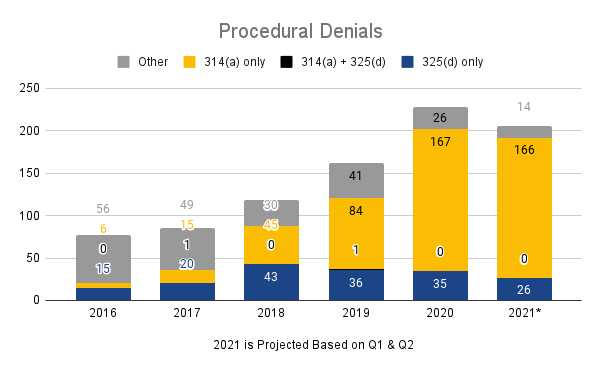Even as Athrex was looming in the background, the PTAB has still managed to deny 104 petitions on procedural ground thus far in 2021. What is interesting, though, is the first quarter saw a combined total of 74 denials on procedural ground, while the second quarter saw a dip, to 30. As projected, discretionary denials are on pace to be just slightly lower in 2021 than in 2020 overall—and that is with more institution decisions in general set to issue.
Despite the dip in procedural denials, § 314(a)—and among that, generally, Fintiv-related denials—is still projected to account for 80% of all procedural denials.
This trend can be seen further below, with 92% of denials being based on either § 314(a) or § 325(d) denials.
Section 314(a) denials are now used by the Board roughly 12.2% of the time, an 0.1% increase from last quarter.
Meanwhile, 325(d) denials continue to fall in line with the previous years, and were used only around 5% of the time.
NHK Spring/Fintiv framework is expected to continue to grow as a percentage of reasoning, with it representing nearly 40% of all denials this year; indeed, the reasoning accounts for 71% of § 314(a) denials.
Interestingly, as previously mentioned in the first quarter report of 2021, the Western District of Texas was projected to see a slight bump in denying petitions using the NHK Spring/Fintiv framework when the patent in question is being disputed in that jurisdiction. Now it would seem like there is a slight decrease in the WDTX, whether from lack of filing attempts, or from the speed of settlement there.
Although the WDTX is now seeing a fourth of all patent disputes nationwide (See Q2 2021 Patent Dispute Report), the Eastern District of Texas is, as of the first half of this year at least, seeing 40% of all NHK Spring/Fintiv denials—up 2% from the previous quarter. The WDTX remains relatively the same seeing a slight decrease of .7%. That is without controlling for speed of settlement or rate of PTAB filings in active cases.
That said, the speed of resolution in patent cases across all districts has risen substantially, even as COVID restrictions have begun to lift; the significant backlog is, rather than dissipating, apparently increasing time-to-resolution across the country.
Compared to last quarter, every district has increased their length to termination. The District of Massachusetts time-to-termination has increased by nearly two months, and the WDTX’s has increased by almost a month, even including the unusually high rate of quick settlement there.
That said, the time-to-trial in the Western District of Texas’ Waco division is 20.48 months (in the mere 20 trials Judge Albright has presided over date); for the seven patent cases he has held, the average time-to-trial is a few days under two years, or 24 months—roughly five months beyond the ambitious target his scheduling orders set. Source: Lex Machina Database (Updated Jul. 6, 2021). The early termination averages in the Western District are driven primarily by hundreds of quick settlements.










